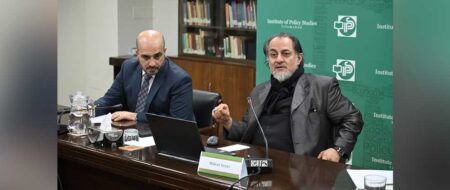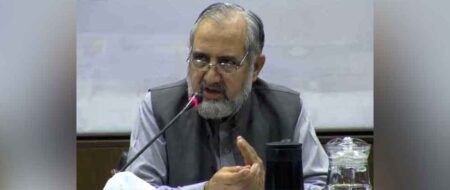Government’s Performance in Power Sector: A Mid-Term Review
Energy crisis may end by 2018 but sustainability a question mark
Pakistan’s energy planners and managers, industry representatives and energy specialists analyzing government’s performance in power sector at an Institute of Policy Studies’ seminar viewed that Pakistan’s energy crisis could possibly be controlled by early 2018 if all the implementation schedules of the 2013 energy policy strategic framework were duly met. Such occurrence, however, would still be a temporary solution as government’s most measures lack far-sighted all-round approach which was critical for good governance and institutional growth and performance.
The seminar titled ‘Government’s Performance in Power Sector: A Mid-Term Review’ held on November 18, 2015, was addressed mainly by Ashfaq Mahmood, former secretary, Water and Power, Syed Akhtar Ali, member (Energy), Planning Commission of Pakistan, Abu Bakar Madni, additional secretary, department of energy, government of Sindh.
The program was chaired by Mirza Hamid Hasan, former secretary, Water and Power and chairman who is also member of IPS-National Academic Council and chairman of its ‘Tawanai’ (energy) program. A number of stakeholders, government officials and experts attended the seminar.
Ashfaq Mahmood critically evaluated the government’s performance in comparison with its strategic framework in 2013 policy in detail.
He said that while the government’s primary target was the elimination of load shedding, its policies were also inclusive of other important areas such as power generation, distribution, theft control, revenue collection, transparency, accountability and customer care. While the government was somewhat successful in reducing load shedding, it cannot find a sustainable resolve unless it pays heed to other mentioned areas as well, he opined.
To achieve the target of eliminating load-shedding by 2017, the present government had aimed at improving the performance of existing GENCOs, however it was still abysmal. A report issued by NEPRA claimed that the efficiencies of generation plants in public sector have declined by 11 per cent to 36 per cent of their design efficiencies and distribution losses were in the range of 9.47 per cent to 33.40 per cent of the electricity received, he informed.
None of the DISCOs met the target set by NEPRA in 2013-14 while in some of the better rated DISCOs, namely FESCO, GEPCO, LESCO and IESCO, the losses even showed increase over the previous year in sharp contrast to NEPRA’s requirement to reduce losses, he added.
He also lamented that the target of coal conversion was also not making much headway, whereas the solar park has started making some contribution but was expensive.
Mahmood lauded the new Power Generation Policy 2015 and termed it as a step in the right direction but half baked.
Other participants of the seminar representing the industry also urged for integrated planning and removal of policy ambiguities in order to ensure long term sustainability and good governance.
Syed Akhtar Ali defended the approach of the Planning Commission and claimed that the amount of efforts being made by the present government in the energy sector were unprecedented and things were gradually improving.
Abu Bakar Madni claimed a paradigm shift in Sindh government’s policies to attract investment in the energy sector and to exploit the immense potential in the province through public-private partnership. He cited the creation of a one-stop department, Thar Coal and Energy Board, and other initiatives of the provincial government like Sindh Renewable Energy Company to attract investments and joint ventures.
He said that Sindh government aims at making the province self-sufficient in power generation and export surplus to other provinces within five years. Thar coal will be generating 5000MW electricity by 2020 while work on 35 projects of wind energy of an indicated total capacity of 1925.4MW has been initiated. Many solar, micro-hydel and thermal projects were also in progress, he informed.












